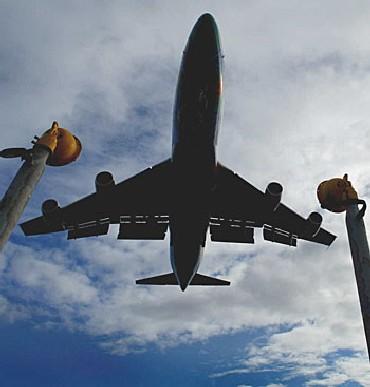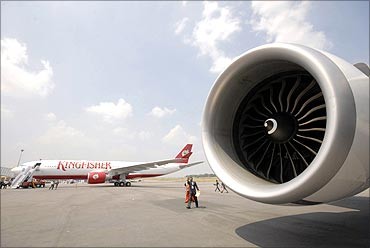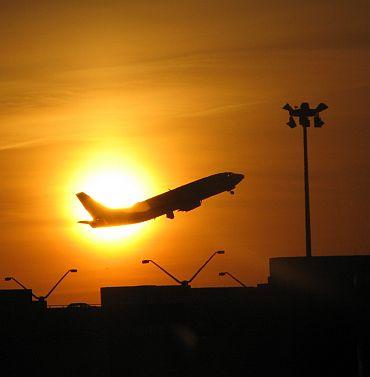
In what may help beleaguered airlines Kingfisher, the finance ministry has approved a draft Cabinet note floated by the commerce and industry ministry allowing foreign fliers to acquire up to 26 per cent stake in India's aviation companies.
However, there is a hitch. The finance ministry wants the commerce and industry ministry to see that any such policy conforms to a new takeover code, where companies have to go for an open offer if they acquire at least 25 per cent stake.
In this regard, the finance ministry wants the Department of Industrial Policy and Promotion (DIPP) under the commerce and industry ministry to consult Securities and Exchange Board of India (Sebi), as some airlines like Kingfisher and Jet Airways are listed companies, officials said on Monday.
The new takeover code, effected by Sebi from October 22, prescribes that any acquirer taking at least 25 per cent stake in a company has to go for an open offer for another 26 per cent.
. . .

Thus, foreign airlines' stake, in case this policy is allowed, can go up to 52 per cent, which would make them majority owner.
The officials said DIPP can, after consultations with Sebi, start working on the Cabinet note. A Cabinet meeting slated for Wednesday, though, is unlikely to take up this issue.
It may come up only either next week or thereafter, depending on a solution to a more pressing and vexed issue before the Cabinet: Foreign direct investment (FDI) in multi-brand retail.
There is another hurdle to the proposal: The civil aviation ministry still favours 24 per cent cap in this regard, which many say will not attract foreign airlines to pick stake in Indian fliers.
. . .

As civil aviation ministry is the nodal ministry in this regard, its views cannot be brushed aside.
Equity analyst Jagannadham Thunuguntla, strategist and head of research with SMC Global Securities Ltd, says this is another area which may face a logjam and take longer to resolve.
His logic: As 25 per cent trigger will come for open offer of 26 per cent. "Foreign airlines may not be interested if they are offered less than 26 per cent stake," Thunuguntla claims.
"The whole purpose would be defeated if an open offer triggers in and they increase their stake to, say, 52 per cent in domestic airlines," he says.
. . .

Against the backdrop of Kingfisher slipping into a severe debt crisis and several others facing resource crunch, DIPP had mooted 26 per cent FDI by foreign airlines into the domestic industry.
The proposal has already received the backing from several other ministries, including home, and the Planning Commission.
At present, foreign investment up to 49 per cent is permitted in the domestic airlines, but foreign carriers are disallowed to make such strategic investments.
Most Indian carriers, with some exception like IndiGo, are loss-making. Full-service carriers such as Air India, Jet Airways and Kingfisher Airlines have high debt on their books.
. . .

Kingfisher, which has cancelled scores of flights, is hunting for strategic investors to tide over a cash crunch.
Earlier, the aviation ministry had said investments worth $30 billion were required in 15 years for the industry to keep up with the booming passenger and cargo traffic requirement.
Currently, 12 greenfield airports are being developed across the country to make India a global airlines hub. As much as 142 million passengers checked in and out of airports across the country during 2010-11, representing a growth of 15 per cent over the previous year, according to Associated Chambers of Commerce and Industry of India.
Even according to conservative estimates, passenger traffic is likely to be around 540 million by 2025, as the fleet size of scheduled airlines has increased now to 1,500 from 430. At the same time, the cargo traffic is expected to touch nine million tonnes from 2.33 million tonnes in the last financial year.